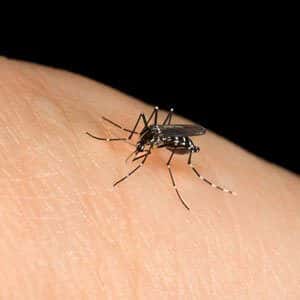
There was a time when Americans really worried about mosquito bites. That’s because during the 18th and 19th centuries malaria was endemic in large parts of the country. It was a leading cause of death, especially in young children.
By 1951 malaria was pretty much eliminated from the United States, thanks in large measure to aggressive use of the pesticide DDT. From the 1950s till the early 21st century, mosquitoes were more of an annoyance than a hazard. People still wanted to keep mosquitoes from biting, but primarily to avoid the itch.
Diseases Spread by Mosquitoes:
Then along came West Nile virus in 1999. This mosquito-borne disease can affect the brain. Cases have been reported in virtually every state except for Alaska and Hawaii. (We answered a question about it from a reader in Florida back in 2002.)
Several other viruses that attack the brain are also transmitted by mosquito bites. They include La Crosse encephalitis in the upper Midwest, mid-Atlantic and southeastern states as well as St. Louis encephalitis in eastern and central states.
With Zika Virus, It Becomes Urgent to Keep Mosquitoes from Biting:
Despite the spread of these viral infections, most Americans have not worried about mosquito-borne illness. The game changer is the Zika virus. Dramatic videos of babies born with microcephaly have a lot of people worried, even though the CDC has not reported any cases of Zika that have been transmitted by mosquito bites in the continental US.
Zika can also affect the nervous system and cause Guillain-Barré Syndrome, which may result in paralysis. Guillain-Barré Syndrome as a consequence of Zika infection is uncommon (one case in 500 in the U.S. so far).
Experts have been arguing about whether the mosquito that transmits Zika can gain a widespread foothold in the U.S. Until that’s determined, the best protection will be air conditioning, window screens and an effective mosquito repellent when you are spending time outside. Those are the best ways to keep mosquitoes from biting you.
Insect Repellents:
The gold standard of modern mosquito repellents is DEET. It was developed by the US military for use by forces fighting in tropical areas.
DEET has been available commercially since 1957. It is effective, but it melts plastic and some people experience skin irritation and even neurological symptoms when high concentrations are used.
Alternatives to DEET:
Fortunately for those who prefer to avoid DEET, there are now other compounds that work well to keep mosquitoes from biting. Consumer Reports tested 16 bug repellents and found that two products with 20 percent picaridin (Sawyer Picaridin and Natrapel 8 Hour) performed just as well as Off! Deepwoods VIII, which contains 25 percent DEET. In fact, the Sawyer Picaridin also did a very good job of repelling ticks, which carry their own collection of nasty diseases.
According to Consumer Reports, Repel Lemon Eucalyptus, with 30 percent lemon eucalyptus oil, was nearly as good. Products based on other natural plant oils hardly worked at all, so they wouldn’t be reliable in preventing mosquito bites or protecting people from Zika or West Nile viral infections.
Using Mosquito Repellent Properly:
Whichever effective insect repellent you choose, use it properly. The best ones protect for about eight hours; after that, they need to be reapplied. They should only be applied to clothing or exposed skin, not on skin under clothing.
A repellent should never be sprayed on the face. Instead, spray it onto the hands and use them to spread it on face, hair and ears. Once the repellent has been applied, wash the hands, especially before eating or drinking anything.
Once you come inside where mosquitoes can’t find you, shower or wash the repellent off. Clothing that has been sprayed should be laundered separately from other clothes.
Some companies sell clothing impregnated with permethrin to deter mosquitoes and ticks. Keeping a separate pair of socks and pants that have been treated with permethrin might be a good idea for people who spend a lot of time outdoors.

